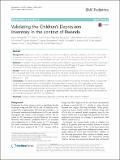| dc.contributor.author | Binagwaho, Agnes | en_US |
| dc.contributor.author | Fawzi, Mary C. Smith | en_US |
| dc.contributor.author | Agbonyitor, Mawuena | en_US |
| dc.contributor.author | Nsanzimana, Sabin | en_US |
| dc.contributor.author | Karema, Corine | en_US |
| dc.contributor.author | Remera, Eric | en_US |
| dc.contributor.author | Mutabazi, Vincent | en_US |
| dc.contributor.author | Shyirambere, Cyprien | en_US |
| dc.contributor.author | Cyamatare, Patrick | en_US |
| dc.contributor.author | Nutt, Cameron | en_US |
| dc.contributor.author | Wagner, Claire | en_US |
| dc.contributor.author | Condo, Jeanine | en_US |
| dc.contributor.author | Misago, Nancy | en_US |
| dc.contributor.author | Kayiteshonga, Yvonne | en_US |
| dc.date.accessioned | 2016-03-01T19:49:09Z | |
| dc.date.issued | 2016 | en_US |
| dc.identifier.citation | Binagwaho, A., M. C. S. Fawzi, M. Agbonyitor, S. Nsanzimana, C. Karema, E. Remera, V. Mutabazi, et al. 2016. “Validating the Children’s Depression Inventory in the context of Rwanda.” BMC Pediatrics 16 (1): 29. doi:10.1186/s12887-016-0565-2. http://dx.doi.org/10.1186/s12887-016-0565-2. | en |
| dc.identifier.issn | 1471-2431 | en |
| dc.identifier.uri | http://nrs.harvard.edu/urn-3:HUL.InstRepos:25658376 | |
| dc.description.abstract | Background: Depression is often co-morbid with chronic conditions, and when combined with HIV it can increase progression and reduce survival. A brief and accurate screening tool for depression among children living with HIV is necessary to increase access to mental health care and improve HIV-related outcomes in the long-term. Methods: A validation study was conducted, comparing the Children’s Depression Inventory (CDI) with a structured clinical assessment as the gold standard among children living with HIV ages 7-14 years in Rwanda. The response rate was 87 % and the analysis was performed among 100 study participants. Results: Twenty-five percent of children had a diagnosis of depression based on the clinical interview. Sensitivity of the CDI ranged from 44 to 76 % and specificity was 92 to 100 % for cut-off scores from 5 to 9. The area under the curve (AUC) for receiver operating characteristic analysis, an estimate of overall accuracy, was 0.87 (95 % confidence interval: 0.77 – 0.97). Conclusions: The significant prevalence of depression among children living with HIV in Rwanda reflects a critical need to advance mental health care in this population. Although overall accuracy of the CDI is reasonable in this context, further research needs to be done to develop a more sensitive measure of depression in this vulnerable population. Development of a highly sensitive screening measure will be a fundamental step towards improving access to mental health care among children living with HIV, potentially improving health outcomes and quality of life in the long-term as this vulnerable population transitions into adulthood. | en |
| dc.language.iso | en_US | en |
| dc.publisher | BioMed Central | en |
| dc.relation.isversionof | doi:10.1186/s12887-016-0565-2 | en |
| dc.relation.hasversion | http://www.ncbi.nlm.nih.gov/pmc/articles/PMC4762156/pdf/ | en |
| dash.license | LAA | en_US |
| dc.subject | Rwanda | en |
| dc.subject | Children | en |
| dc.subject | Adolescents | en |
| dc.subject | Depression | en |
| dc.subject | Screening | en |
| dc.subject | HIV | en |
| dc.subject | Chronic disease | en |
| dc.subject | Validation | en |
| dc.title | Validating the Children’s Depression Inventory in the context of Rwanda | en |
| dc.type | Journal Article | en_US |
| dc.description.version | Version of Record | en |
| dc.relation.journal | BMC Pediatrics | en |
| dash.depositing.author | Binagwaho, Agnes | en_US |
| dc.date.available | 2016-03-01T19:49:09Z | |
| dc.identifier.doi | 10.1186/s12887-016-0565-2 | * |
| dash.authorsordered | false | |
| dash.contributor.affiliated | Binagwaho, Agnes | |


